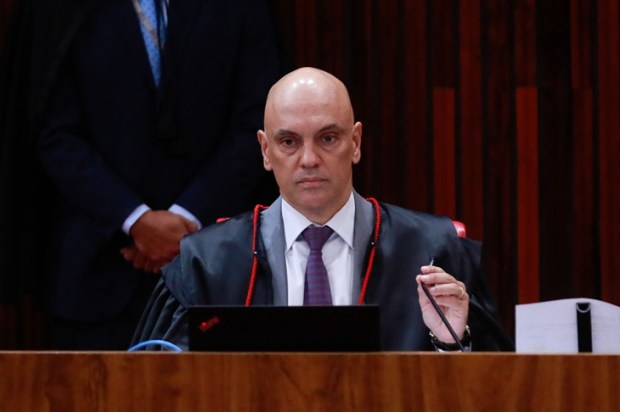Chris Minns employs an effective, if underutilised tactic in messaging contentious political issues: Brazenness.
Minns first piqued the interest of my American colleagues in March when he appeared at a press conference to suggest, defiantly, that New South Wales couldn’t have the same free speech laws enjoyed in the United States. A clever bit of chutzpah perhaps, or so it seemed, until he repeated the line again later that month, and then again in July.
‘We don’t have the same freedom of speech rules that they have in the US,’ Minns boasts. ‘For a very specific reason.’
That reason? Multiculturalism.
Minns believes the ‘right’ of anyone to not feel vilified on cultural-racial grounds trumps the right to freedom of expression. The restrictive laws his government passed earlier this year make that clear. Minns and his government, it seems, really do believe a right to free speech is a bad thing for a vibrant, pluralistic society. Moreover, he is determined to make the point in stark contradistinction to the jurisdiction in which free speech is enjoyed more famously than anywhere else.
The Premier of New South Wales can only justify his antagonism toward ‘US Style’ free speech on the logical deduction that a ‘multicultural’ society is one that is fundamentally more fragile than its alternative. This is in itself troublesome, and a discussion over the virtues of multicultural fragility perhaps deserves a separate article’s treatment.
Minns’ argument to secure this more fragile polity is to give it less freedom, and to presume it less capable of moral discernment. Fragile communities ought to be secured by radically more restrictive laws. Where John Adams proclaimed the US Constitution fit for none other than a ‘moral and religious people,’ ought Minns’ New South Wales now be considered by comparison an ‘amoral and fragile’ constituency?
Are New South Welshmen content with that descriptor?
That is what Minns appears to say about them – that they are incapable of self-governance, incapable of the judicious treatment of ideas, and incapable of resilience and self-inoculation against hurt feelings. There are no other plausible grounds on which a governor extends power over the governed, than by balancing the people’s supposed meekness with a purported to executive might.
Setting aside that Minns has drawn the strange conclusion that his multiculturalism is somehow more deserving of restrictive speech laws than everyone else’s (New York City, Sydney’s closest American equivalent, is far more multicultural than the NSW Capital), his predilection for a de facto censorship state ought to chill voters: according to Minns, the government shall decide the threshold upon which speech becomes ‘racist’ and shall punish you for it. Endanger the fabric of ‘multicultural’ New South Wales and you face jail for up to two years.
Minns found fertile ground for pretext in ushering in his speech laws in the shameful treatment of Australian Jews at the hands of Islamist, antisemitic protestors over the summer of 2023-24. Whilst those episodes were appalling – the chants at the Opera House forecourt should rightly live in infamy as a dark day in Australian history – they cannot and will not be remedied by placing legal restrictions on free speech.
In the lead up to the 2024 Presidential election I hosted then-candidate (now Secretary) Robert F. Kennedy Jnr and longtime head of the American Civil Liberties Union, Nadine Strossen, for a discussion on free speech and Civil Discourse, at the University of Austin. Kennedy’s detailed exposition on the path to tyranny via legalised censorship bears watching. So too does both he and Strossen’s specific citing of the 1977 ‘Skokie affair’ where the US Supreme Court allowed American Nazis to march through the predominantly Jewish town of Skokie, Illinois. For Kennedy, Strossen, and the 1977 Court, the danger in allowing even heinous speech, was more tolerable to the danger in giving government the power to ban it.
Minns should know what he terms ‘the free speech laws that are in place in America’ in fact carry greater import than mere rules. They form part of a right; the first and most important one, set forth in the Bill of Rights, ratified as the first amendment to the US Constitution in 1791. The First Amendment protects freedom of religion, the press, assembly, petition, and, the mother category, speech. It forms a vital part of the supreme law of the land and completes the most important legal document since the Magna Carta in 1215. The first amendment is the first amendment for a reason: It is the most civilisationally vital, comparable in value only to the second, the right to bear arms, which is there by design to secure the first.
Minns’ ongoing attempt to defend his predilection for censorship is a bizarre bit of effrontery, mainly because any reasonable ‘liberal’, whether left or right adjacent, would ordinarily seek to take advantage of the right to free speech, before denigrating it as old-hat, or casting it into the basket of legal deplorables suitable only for ‘stupid’ and ‘racist’ Americans.
My colleague, Michael Shellenberger, has described beautifully how the gift of a free speech ‘norm’ is in fact, an historical anomaly. Its enshrinement in the 1791 Bill of Rights is the breakthrough real-world achievement in a long trail of philosophical antecedents stretching back to the pursuit of truth engaged in by Socrates in pre-Christian Greek antiquity. It is not that a species of thought commensurate with what Minns would call ‘US style’ laws hadn’t arisen before the American Revolution. But the accessibility and application of free speech amongst everyday people as a means to hold government in check and pursue truth in real-world settings reached new heights in the hands of the framers of the US Constitution.
A lifelong Labor machine-man, Minns’ own particular experience with life in America may prove indicative of his ideological formation: His one break from service in the Labor party came in 2012-13, by way of a stint at Princeton University. Like its fellow travellers in the intellectually decrepit Ivy League, Princeton has an appalling reputation for free speech in the 21st Century. In 2013, Minns’ graduating year, the University ranked 223rd out of 251 colleges surveyed, in the Foundation for Individual Rights and Expression’s rankings for free speech on campus. Over a decade later, its position hasn’t budged.
Exploiting false perceptions of American politics for domestic gain is flavour of the month for Australia’s retail politicians. Donald Trump’s spoken brashness may have further opened the door to an easy ‘you don’t want what they have’ argument on both the Australian left and right. Still, Minns and his ilk are playing with fire in purporting to dismantle 250 years of broadly agreed-upon free speech norms in their own little corner of the western hemisphere.
Australia is mercifully not yet at the stage of societal suicide-by-censorship being experienced conspicuously in Germany, Britain, and throughout Europe. But the hour is close, and the willful denigration of America’s sublime civilisational achievement in speech is a fool’s errand.
Ben Crocker is University Dean, at UATX.

























